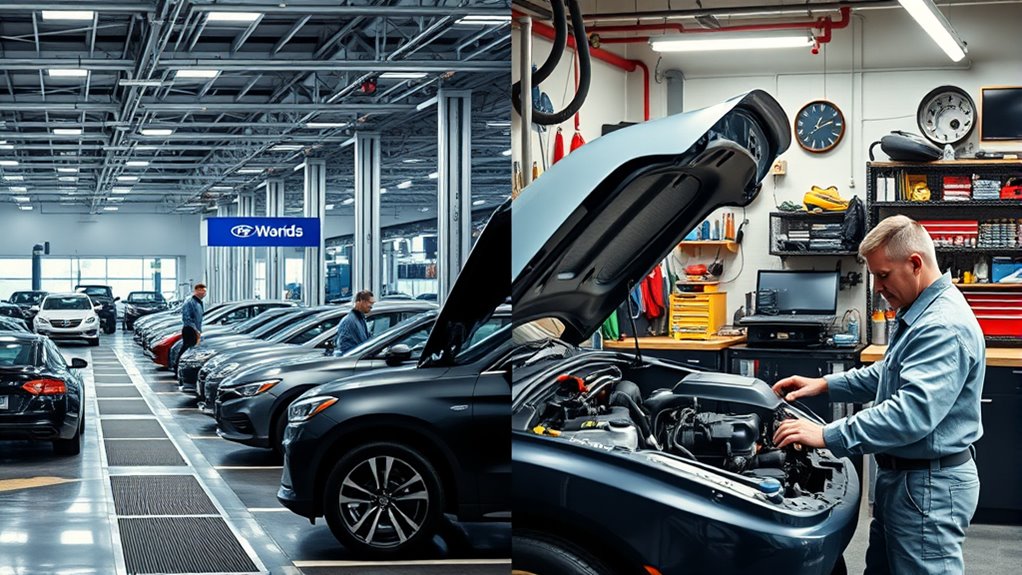Choosing between dealership service and independent shops depends on what matters most to you. Dealerships often offer factory-backed warranties and specialized diagnostic tools, but they can be pricier. Independent shops usually provide more competitive rates and quicker, personalized service, though their warranty coverage might be limited. Consider your vehicle’s needs, budget, and convenience preferences. To understand the key advantages and drawbacks of each, keep exploring the details below.
Key Takeaways
- Dealerships offer factory-backed warranties and OEM parts but often at higher costs.
- Independent shops usually provide more affordable services and flexible scheduling options.
- Dealerships have specialized diagnostic tools for complex or brand-specific issues, ensuring accuracy.
- Independent shops may have experienced technicians and comparable diagnostic capabilities for certain brands.
- Convenience varies: dealerships often provide loaner vehicles and structured hours, while independents may offer quicker service.

When it comes to maintaining your vehicle, you might wonder whether to choose dealership service or an independent shop. Both options have their advantages, but understanding how they differ can help you make an informed decision. One key factor to consider is warranty coverage. Dealerships often provide factory-backed warranties, which means that repairs performed there are typically covered under the manufacturer’s warranty. This can give you peace of mind, knowing that if something goes wrong after a repair, you won’t have to pay out of pocket. Independent shops, on the other hand, usually don’t offer the same warranty coverage, or if they do, it’s often limited. Still, many independent mechanics stand behind their work with guarantees, so it’s worth asking about warranty policies before making a choice. Additionally, understanding the importance of aura management strategies can help in maintaining overall vehicle well-being and emotional health.
Dealerships often offer factory-backed warranties for added peace of mind.
Another critical aspect is diagnostic expertise. Dealerships tend to have specialized diagnostic tools and technicians trained specifically on your vehicle’s make and model. This often results in more accurate and efficient diagnosis of complex issues. If your car has a complicated problem or if it’s relatively new with advanced technology, a dealership’s diagnostic capabilities might be your best bet. Independent shops, however, can also be highly skilled and may have invested in advanced diagnostic equipment, especially if they focus on a particular brand or type of vehicle. Their technicians might have extensive experience troubleshooting common issues, and they often provide a more personalized service experience.
Cost is another significant difference. Dealerships generally charge higher labor rates, partly due to their brand reputation and the use of original equipment manufacturer (OEM) parts. Independent shops often offer more competitive pricing and may use aftermarket or remanufactured parts, which can save you money. However, this might affect the warranty coverage or the quality of parts used, so it’s worth discussing these details upfront.
Convenience also plays a role. Dealerships usually operate with more structured schedules, often offering loaner vehicles or shuttle services, making it easier to get your car serviced without disrupting your day. Independent shops might have shorter wait times or more flexible scheduling, but their services may not be as thorough or as quick, depending on their workload.
Ultimately, your choice depends on your priorities. If warranty coverage and precise diagnostics are your main concerns, a dealership might be the better option. But if you’re looking for cost-effective repairs and personalized service, an independent shop could be just what you need. Either way, doing your homework and asking questions guarantees you find the right fit for your vehicle’s maintenance needs.
Frequently Asked Questions
How Do Pricing Differences Impact Overall Vehicle Maintenance Costs?
Pricing differences markedly impact your vehicle maintenance costs by influencing your overall budget. Dealerships often use pricing strategies that include higher labor rates and parts markup, which can raise costs. Independent shops typically offer more transparent pricing, making it easier for you to compare prices and avoid surprises. By understanding these differences, you can choose services that fit your budget while maintaining quality, ultimately saving you money over time.
What Are the Best Ways to Evaluate Shop Reputation and Quality?
You can evaluate a shop’s reputation and quality by checking customer reviews online, paying attention to consistent positive feedback. Also, look for shops with certification programs, like ASE or manufacturer-specific certifications, which indicate trained technicians and quality standards. Visit the shop in person to assess cleanliness and professionalism. Asking friends or family for recommendations can also help guarantee you choose a reputable, high-quality service provider.
Do Independent Shops Offer Better Warranties Than Dealerships?
Independent shops often offer better warranty coverage and repair guarantees than dealerships. They tend to provide more personalized service and are willing to stand behind their work with flexible warranties. You might find their warranty terms more generous or easier to claim. However, it’s always smart to compare specific warranties and repair guarantees, as coverage can vary widely. Ultimately, choosing a shop with solid warranties guarantees you’re protected long-term.
How Does the Availability of OEM Parts Influence Repair Quality?
A stitch in time saves nine, and using OEM parts guarantees your repairs are excellent. When OEM parts are readily available, you get better repair precision, preserving your vehicle’s performance and longevity. They’re designed specifically for your car, reducing the risk of future issues. Without OEM parts, repairs might be rushed or imprecise, risking more problems down the road. Prioritize OEM parts for reliable, high-quality repairs that keep your vehicle running smoothly.
Can Independent Mechanics Handle Complex or Specialized Vehicle Repairs?
Yes, independent mechanics can handle complex or specialized vehicle repairs, but it depends on their diagnostic expertise and access to specialized equipment. Many skilled independent shops invest in advanced tools and training to tackle intricate issues. However, for highly complex repairs, dealerships might have an edge due to their direct manufacturer support and OEM parts. Still, a well-equipped independent can often deliver quality results at a lower cost.
Conclusion
So, which option will you choose—the trusted dealership or the independent shop? Each has its perks and pitfalls, but the final decision might just hinge on what’s waiting around the corner. Will you prioritize expert knowledge or personalized service? The choice isn’t always clear, and the right decision could change your vehicle’s future. Think carefully—your next move could be more impactful than you realize. Are you ready to make it?









